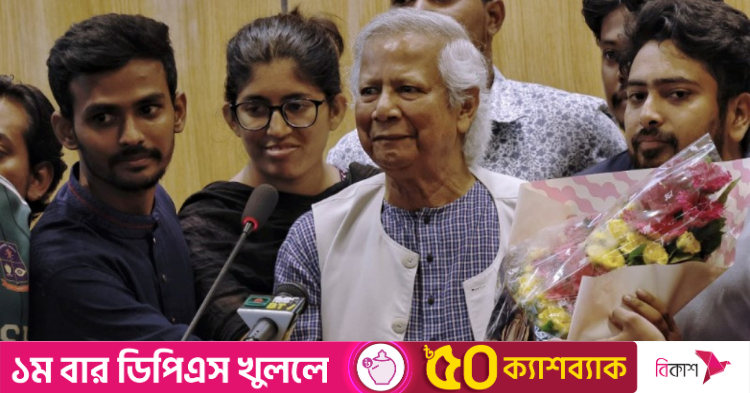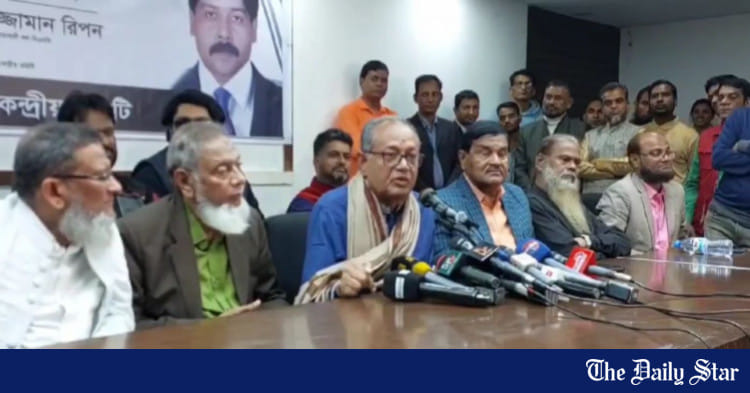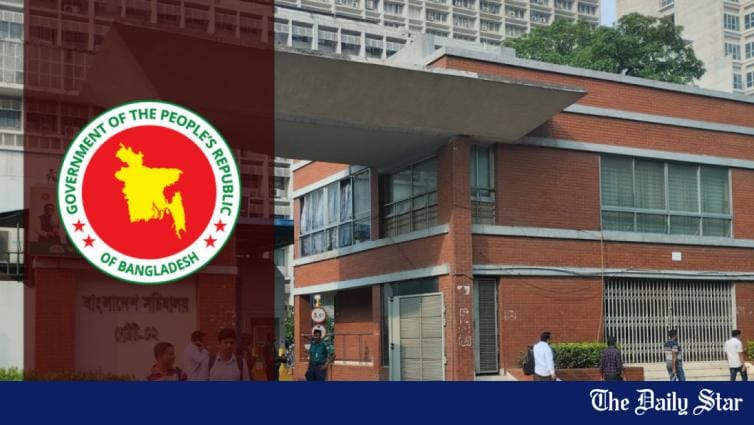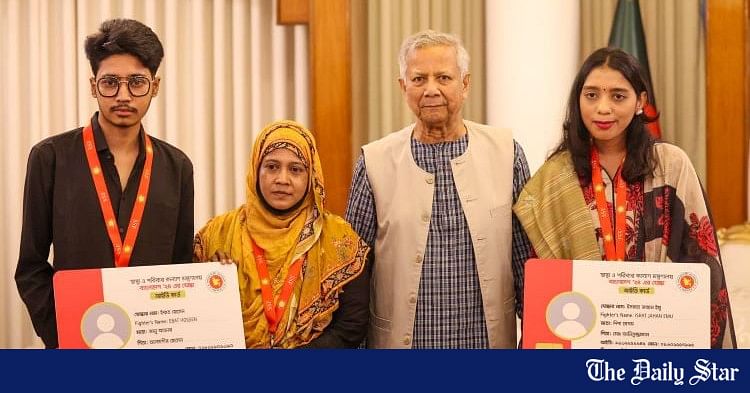Saif
Senior Member
- Messages
- 15,397
- Nation

- Axis Group


July revolution and Prof Yunus: A winning combination
A transition from a dictatorial regime to democracy is almost akin to breathing life into a corpse.
July revolution and Prof Yunus: A winning combination

Nobel laureate Muhammad Yunus is pictured during a press briefing as he arrives at the Hazarat Shahjalal International Airport, in Dhaka, Bangladesh, August 8, 2024. FILE PHOTO: REUTERS
When Prof Yunus was sworn in as the chief adviser of the interim government on August 8 of this year, a feeling of déjà vu consumed me. I was transported back to 2006, when I was a graduate student at a university in California. I was working out at the gym in the morning. The TV right in front of my treadmill flashed Prof Yunus, as the newscaster mentioned that he had won the Nobel Peace Prize. I jumped out of the gym and started running to the office of my course coordinator. Before she could greet me as she suddenly found me next to her chair, I said, "Dr Lynne, a Bangladeshi won the Nobel Peace Prize this year." She smiled and said, "We know Professor Yunus. You are the next." I was so delightfully delusional that I had no idea what she meant. All I knew was that Bangladesh achieved nothing more dignified and desirable than winning the Nobel Peace Prize since our independence in 1971. When I left her office, I realised that Prof Yunus had re-defined Bangladesh, which was off to a new beginning. Unfortunately, nothing apparently has changed since. Politics has swamped everything.
While our political crisis climaxed this past July, Bangladesh has always been politically precarious since its bloody birth in 1971. The lever of political power alternated between demagogues and dictators. Most of them were intellectually half-baked. They understood neither politics, nor economics. All of them were apparently con artists. They attempted to become popular, while their credibility nixed. They rigged elections. They celebrated trumped-up victories. They led without knowing whatsoever how a country runs. The country runs anyway, backward or forward, with or without a leader. A gated community of gonifs (the Hanifs, in our case!) feeds the fantasy of such a leader that she is inevitable and accomplished. While she ensconces herself in power and pride, the carpetbaggers erode the vitals of the country. Mismanagement metastasises. People feel betrayed and vulnerable. What happens when such political paralysis persists? Hasina happens! Fascism happens! Genocide happens! In a political climate such as this, winning a Nobel Prize is apparently criminal. No wonder that they filed 198 court cases against Prof Yunus, as Deutsche Welle claims. Nothing, however, diminishes the fact that Prof Yunus is our one-off achievement. He has the charisma and credibility to help the nation achieve further.
The Hasnats knew it. When the July revolution culminated in Hasina's flight from the country on the August 5, the architects of the revolution (i.e., the student coordinators) realised that it occasioned an extraordinary opportunity to reclaim and reform the country that the Hasinas continue to own and run and ruin for decades. Unless a comprehensive electoral, judicial, financial, bureaucratic, and constitutional reform is enacted, the Hasinas will continue to kill the Abu Syeds. The nation will continue to barrel backward, when crime, corruption, and injustice mount. Under these circumstances, the country didn't need a steward, who could smoothly transition power through an election. The country needed a reformer, who would ensure a fair and participatory election having undertaken some fundamental reforms. The country needed someone, who was authentic and exemplary. Only Prof Yunus seemed to have the sentimental and professional capital to fill the slot. Hasina's government was so disconnected from the people that they didn't realise that the more they disgraced Prof Yunus, the more love and respect and empathy hemmed around him. Add to that his accomplishments, global connections, and reputation. When he consented to become the chief adviser of the interim government, the most critical foundation of the July revolution was laid.
As we started to look forward when the interim government took over, the forces of the fallen regime threatened to push us backward. Movements erupted. Law and order deteriorated. The country seemed volatile and unpredictable. People started to feel hopeless and helpless. The interim government looked severely strained. Such a situation was very unfortunate but was never unexpected. Hasina flooded the country with illegal arms and money. The country was already massively insecure and explosive. The agents of anarchy stalked all around the country. They resisted, as Hasina suddenly sneaked out of the country. And their resistance was not political; it was existential, instead. They stood exposed and felt endangered, as Hasina's regime fizzled. They wanted her back for their survival. Hasina has been a textbook example of a dictator, like the Peruvian dictator, Óscar R Benavides, who famously said, "For my friends everything, for my enemies the law." She changed the political culture and calculus of the country so irreversibly during the last 15 years that a quick-fix is unlikely. However, the "reset button" is already set. As things gradually continue to fall on the right track, we must remember that Prof Yunus is anything but a magician.
A transition from a dictatorial regime to democracy is almost akin to breathing life into a corpse. Dictators are addicted to killing. They kill people. They kill institutions. They kill courage and conviction. Along the way, they massively infiltrate the members of incestuously interconnected families into a system that thrives in isolation, intimidation, and pessimism. Resistance and unity dwindle. Stupidity becomes strength. Arrogance becomes a virtue. In the meantime, some bridges, flyovers, and tunnels happen. The cronies besetting the dictator construct a grand narrative of development claiming, "She has shown us out of pobeti [sic]."
Hasina's Bangladesh was a political circus. She had "LOL" models to rule the country, who were devoid of brainpower, integrity, and patriotism. Prof Yunus exists at the opposite end of such a political spectrum. He is an intellectual, who is worldly. He knows how politics functions. His vision of the world is not romantic or recondite. He wants the political system re-shaped around the economics of zero poverty, zero unemployment, and zero net carbon emissions. He is deeply invested in making the world a better place. Besides, he has aged gracefully. He is never publicly angry or annoyed. He maintains a low-key demeanour. A personality of his stature doesn't fit in the political mess that Hasina's Bangladesh was. It's, however, no longer Sheikh Hasina's Bangladesh, as our Law Adviser Asif Nazrul said.
Therefore, Prof Yunus becomes critical to guiding and transforming the nation to a new height. The nation wants to get out of the politics of bullshitting and blood-shedding. However capable Prof Yunus potentially is, we must not forget that he has inherited bankruptcy. Hasina left the country shattered. Hasina was psychologically unhinged. She was a narcissistic megalomanic. She was always smut and huffy, when she pretended that she was above human follies. She never confessed to have erred. For example, she bragged about her zero-tolerance policy to corruption, when she claimed that her peon scrounged around Tk 400 crores. Citing the governor of Bangladesh Bank, The New York Times reported recently that about $17 billion was syphoned from the country's financial system in the 15 years of Hasina's regime. The country is apparently cash-strapped now. When the country reels under heavy foreign loans incurred by Hasina's government, the interest rates continue to spike, adding further financial burden to the interim government. Inflation increases and the prices of commodities spike. It's a vicious cycle the interim government is trapped in, which seriously threatens its popularity and capacity. Policing would have contributed to streamlining commodity prices to some extent. The police department has crumbled under its own crime and corruption, thanks to Hasina. While considerable improvement is visible on these fronts, I apprehend that these problems might linger a little longer.
Under any circumstances, though, nothing can fracture Prof Yunus's fortitude. He is focused on and heading steadily toward the goals the Tabassums, along with the rest of the people of this country, want him to accomplish. Never before has so much possibility beckoned Bangladesh. Never before have so many problems beset Bangladesh. The country is hollow at the core. Conspiracies and propaganda brew constantly. Neighbourly knavery flares up. We are in an extraordinary phase of our national history. If we don't move ahead cautiously, tomorrow's Bangladesh is anyone's guess. Arundhati Roy reminds us in her Boston Review interview, "How to Think About Empire," what Prof Yunus reiterates since he took over that we must not fool ourselves into believing that the change we want will come with fresh election as the "old *&*&*&*&*&*&*&*&" are out of office. They will bounce in if we renew the politics of voting with the same old system in place. That's not an option for the new Bangladesh that emerged following the July revolution.
It was a goosebump moment for me when Prof Yunus won the Nobel Prize in 2006, and the same feeling renewed in 2024, when he was sworn in as chief adviser. I'm persuaded to think that no one is more poised to embody and draw from the unity and harmony that the July revolution built across Bangladesh. We needed a stalwart, who is above partisan interest and material greed, for Bangladesh to emerge anew. We have it now.
Relax, Bangladesh!
Dr Mohammad Shamsuzzaman is associate professor at the Department of English and Modern Languages in North South University (NSU).
Nobel laureate Muhammad Yunus is pictured during a press briefing as he arrives at the Hazarat Shahjalal International Airport, in Dhaka, Bangladesh, August 8, 2024. FILE PHOTO: REUTERS
When Prof Yunus was sworn in as the chief adviser of the interim government on August 8 of this year, a feeling of déjà vu consumed me. I was transported back to 2006, when I was a graduate student at a university in California. I was working out at the gym in the morning. The TV right in front of my treadmill flashed Prof Yunus, as the newscaster mentioned that he had won the Nobel Peace Prize. I jumped out of the gym and started running to the office of my course coordinator. Before she could greet me as she suddenly found me next to her chair, I said, "Dr Lynne, a Bangladeshi won the Nobel Peace Prize this year." She smiled and said, "We know Professor Yunus. You are the next." I was so delightfully delusional that I had no idea what she meant. All I knew was that Bangladesh achieved nothing more dignified and desirable than winning the Nobel Peace Prize since our independence in 1971. When I left her office, I realised that Prof Yunus had re-defined Bangladesh, which was off to a new beginning. Unfortunately, nothing apparently has changed since. Politics has swamped everything.
While our political crisis climaxed this past July, Bangladesh has always been politically precarious since its bloody birth in 1971. The lever of political power alternated between demagogues and dictators. Most of them were intellectually half-baked. They understood neither politics, nor economics. All of them were apparently con artists. They attempted to become popular, while their credibility nixed. They rigged elections. They celebrated trumped-up victories. They led without knowing whatsoever how a country runs. The country runs anyway, backward or forward, with or without a leader. A gated community of gonifs (the Hanifs, in our case!) feeds the fantasy of such a leader that she is inevitable and accomplished. While she ensconces herself in power and pride, the carpetbaggers erode the vitals of the country. Mismanagement metastasises. People feel betrayed and vulnerable. What happens when such political paralysis persists? Hasina happens! Fascism happens! Genocide happens! In a political climate such as this, winning a Nobel Prize is apparently criminal. No wonder that they filed 198 court cases against Prof Yunus, as Deutsche Welle claims. Nothing, however, diminishes the fact that Prof Yunus is our one-off achievement. He has the charisma and credibility to help the nation achieve further.
The Hasnats knew it. When the July revolution culminated in Hasina's flight from the country on the August 5, the architects of the revolution (i.e., the student coordinators) realised that it occasioned an extraordinary opportunity to reclaim and reform the country that the Hasinas continue to own and run and ruin for decades. Unless a comprehensive electoral, judicial, financial, bureaucratic, and constitutional reform is enacted, the Hasinas will continue to kill the Abu Syeds. The nation will continue to barrel backward, when crime, corruption, and injustice mount. Under these circumstances, the country didn't need a steward, who could smoothly transition power through an election. The country needed a reformer, who would ensure a fair and participatory election having undertaken some fundamental reforms. The country needed someone, who was authentic and exemplary. Only Prof Yunus seemed to have the sentimental and professional capital to fill the slot. Hasina's government was so disconnected from the people that they didn't realise that the more they disgraced Prof Yunus, the more love and respect and empathy hemmed around him. Add to that his accomplishments, global connections, and reputation. When he consented to become the chief adviser of the interim government, the most critical foundation of the July revolution was laid.
As we started to look forward when the interim government took over, the forces of the fallen regime threatened to push us backward. Movements erupted. Law and order deteriorated. The country seemed volatile and unpredictable. People started to feel hopeless and helpless. The interim government looked severely strained. Such a situation was very unfortunate but was never unexpected. Hasina flooded the country with illegal arms and money. The country was already massively insecure and explosive. The agents of anarchy stalked all around the country. They resisted, as Hasina suddenly sneaked out of the country. And their resistance was not political; it was existential, instead. They stood exposed and felt endangered, as Hasina's regime fizzled. They wanted her back for their survival. Hasina has been a textbook example of a dictator, like the Peruvian dictator, Óscar R Benavides, who famously said, "For my friends everything, for my enemies the law." She changed the political culture and calculus of the country so irreversibly during the last 15 years that a quick-fix is unlikely. However, the "reset button" is already set. As things gradually continue to fall on the right track, we must remember that Prof Yunus is anything but a magician.
A transition from a dictatorial regime to democracy is almost akin to breathing life into a corpse. Dictators are addicted to killing. They kill people. They kill institutions. They kill courage and conviction. Along the way, they massively infiltrate the members of incestuously interconnected families into a system that thrives in isolation, intimidation, and pessimism. Resistance and unity dwindle. Stupidity becomes strength. Arrogance becomes a virtue. In the meantime, some bridges, flyovers, and tunnels happen. The cronies besetting the dictator construct a grand narrative of development claiming, "She has shown us out of pobeti [sic]."
Hasina's Bangladesh was a political circus. She had "LOL" models to rule the country, who were devoid of brainpower, integrity, and patriotism. Prof Yunus exists at the opposite end of such a political spectrum. He is an intellectual, who is worldly. He knows how politics functions. His vision of the world is not romantic or recondite. He wants the political system re-shaped around the economics of zero poverty, zero unemployment, and zero net carbon emissions. He is deeply invested in making the world a better place. Besides, he has aged gracefully. He is never publicly angry or annoyed. He maintains a low-key demeanour. A personality of his stature doesn't fit in the political mess that Hasina's Bangladesh was. It's, however, no longer Sheikh Hasina's Bangladesh, as our Law Adviser Asif Nazrul said.
Therefore, Prof Yunus becomes critical to guiding and transforming the nation to a new height. The nation wants to get out of the politics of bullshitting and blood-shedding. However capable Prof Yunus potentially is, we must not forget that he has inherited bankruptcy. Hasina left the country shattered. Hasina was psychologically unhinged. She was a narcissistic megalomanic. She was always smut and huffy, when she pretended that she was above human follies. She never confessed to have erred. For example, she bragged about her zero-tolerance policy to corruption, when she claimed that her peon scrounged around Tk 400 crores. Citing the governor of Bangladesh Bank, The New York Times reported recently that about $17 billion was syphoned from the country's financial system in the 15 years of Hasina's regime. The country is apparently cash-strapped now. When the country reels under heavy foreign loans incurred by Hasina's government, the interest rates continue to spike, adding further financial burden to the interim government. Inflation increases and the prices of commodities spike. It's a vicious cycle the interim government is trapped in, which seriously threatens its popularity and capacity. Policing would have contributed to streamlining commodity prices to some extent. The police department has crumbled under its own crime and corruption, thanks to Hasina. While considerable improvement is visible on these fronts, I apprehend that these problems might linger a little longer.
Under any circumstances, though, nothing can fracture Prof Yunus's fortitude. He is focused on and heading steadily toward the goals the Tabassums, along with the rest of the people of this country, want him to accomplish. Never before has so much possibility beckoned Bangladesh. Never before have so many problems beset Bangladesh. The country is hollow at the core. Conspiracies and propaganda brew constantly. Neighbourly knavery flares up. We are in an extraordinary phase of our national history. If we don't move ahead cautiously, tomorrow's Bangladesh is anyone's guess. Arundhati Roy reminds us in her Boston Review interview, "How to Think About Empire," what Prof Yunus reiterates since he took over that we must not fool ourselves into believing that the change we want will come with fresh election as the "old *&*&*&*&*&*&*&*&" are out of office. They will bounce in if we renew the politics of voting with the same old system in place. That's not an option for the new Bangladesh that emerged following the July revolution.
It was a goosebump moment for me when Prof Yunus won the Nobel Prize in 2006, and the same feeling renewed in 2024, when he was sworn in as chief adviser. I'm persuaded to think that no one is more poised to embody and draw from the unity and harmony that the July revolution built across Bangladesh. We needed a stalwart, who is above partisan interest and material greed, for Bangladesh to emerge anew. We have it now.
Relax, Bangladesh!
Dr Mohammad Shamsuzzaman is associate professor at the Department of English and Modern Languages in North South University (NSU).





